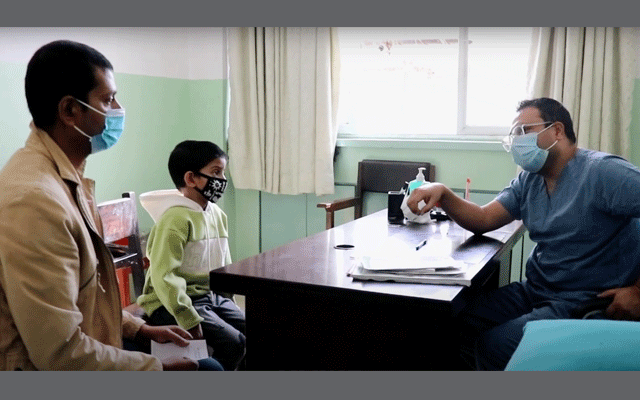The WFH Humanitarian Aid Program is changing lives of patients with bleeding disorders in Nepal. Donated factor provided by the Program to the local national member organization (NMO)—the Nepal Hemophilia Society (NHS)—is making regular and emergency treatment possible in the country, allowing patients to enjoy a greater quality of life and a new level of physical independence.
Bishesh Sharma Poudyal, MD, is a clinical hematologist and the head of the hemophilia treatment centre (HTC) at the Civil Service Hospital in Kathmandu, Nepal. He works closely with the NHS and the World Federation of Hemophilia (WFH) to support the Nepalese bleeding disorders community. Poudyal has worked with the WFH on a number of endeavours, including the WFH World Bleeding Disorders Registry (WBDR), the WFH Twinning Program, and the WFH Humanitarian Aid Program. Poudyal explains that the Humanitarian Aid Program is critical to patients in Nepal because the country is completely dependent on donated factor to treat patients. This donated factor makes regular and acute treatment possible, and also makes it possible for patients to have life-saving surgery. “The WFH Humanitarian Aid Program,” Poudyal explains, “has always supported us and provided us with clotting factor when needed.”
Om Krishna Sakhakarmi is from Bhaktapur, Nepal. He is 23, and has severe hemophilia A with inhibitors. Sakhakarmi suffered many bleeds in his knee, with the result that by his twenties he had severely restricted mobility in the joint. Thanks to donated factor provided by the WFH Humanitarian Aid Program, he was able to undergo joint replacement surgery—the first in the country. As a result of the procedure, his quality of life improved dramatically. His mobility has improved, he is more independent, and he has been able to go back to school and begin studying 3D animation. “Thank you to the WFH Humanitarian Aid Program,” says Krishna Sakhakarmi. “For providing life-saving factor.”
Jagat Man Rajbahak, 30, from Bhaktapur, Nepal, also has also benefitted from the WFH Humanitarian Aid Program. Like Krishna Sakhakarmi, he has severe hemophilia A with inhibitors, and lived through repeated bleeding in a knee. Suffering from chronic pain and increasingly limited mobility since childhood, his condition deteriorated to the point where he couldn’t leave his home to do basic activities. Eventually, he was diagnosed with a pseudotumour in his knee and the situation became life-threatening. Fortunately, through the efforts of the WFH Humanitarian Aid Program, he underwent surgery and now has a prosthetic leg. Rajbahak now enjoys a much greater quality of life, is independent, and was able to open up his own mobile phone repair shop. He credits the WFH Humanitarian Aid Program and Bishesh Sharma Poudyal with helping him: “I was in a life-or-death situation,” he explains. “I am alive today because of their help.”
The WFH has also helped the Nepalese bleeding disorders community in other ways. Thanks to WFH workshops and publications, physicians and other healthcare workers are more interested in hemophilia care and are more willing to support the community.
The overall impact of the WFH Humanitarian Aid Program in Nepal is significant. Barun Khakurel, NHS Vice President and Coordinator of the Medical Division, says that, “We are immensely grateful to the WHF for supporting us continuously. We have been able to save hundreds of lives which would not have been possible without their generous donations.”.
About the WFH Humanitarian Aid Program













